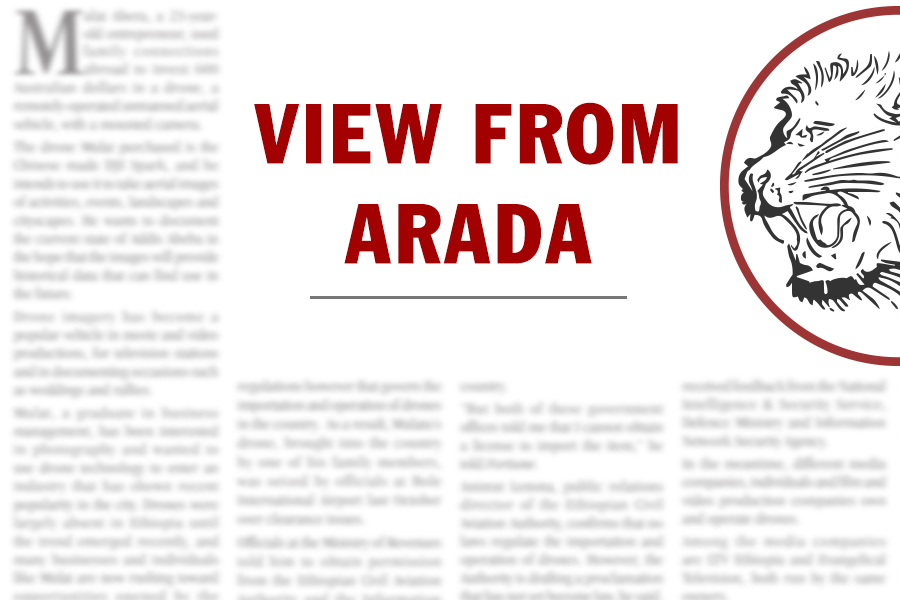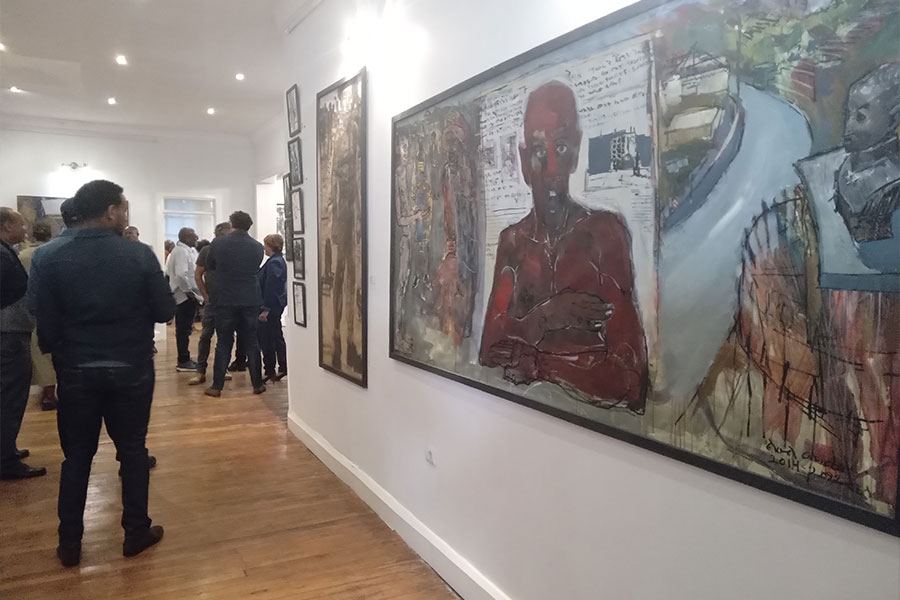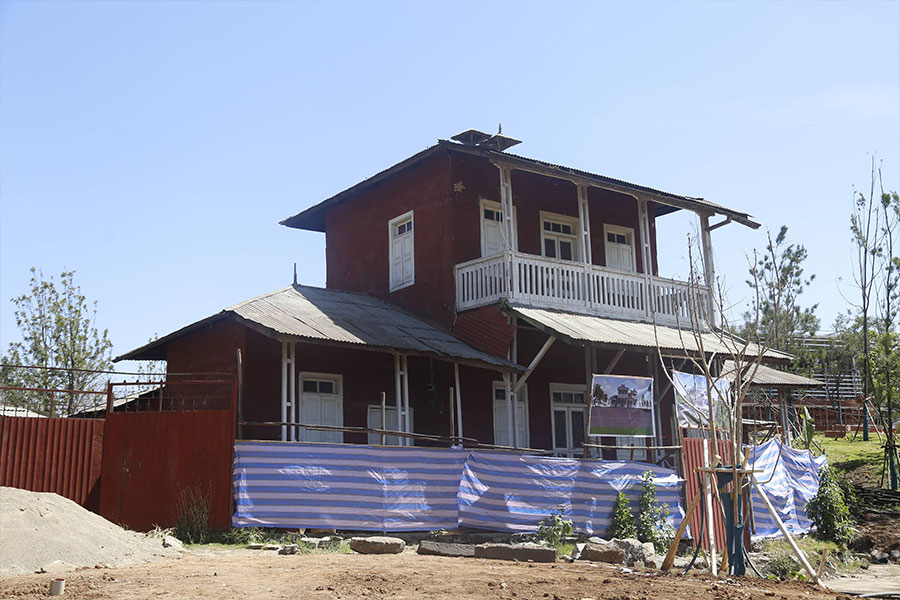
View From Arada | Nov 30,2019
May 18 , 2019
By
Ethiopia’s economy is in the doldrums. This is not surprising given that a large number of obstacles face the business sector. The foreign currency crunch is perhaps the most glaring obstacle at the moment. But so are recurring water shortages, regular electric power interruptions and unreliable internet services.
But a national malaise that overhangs the nation is a poor work culture. At least, access to water and electricity are expanding if not reliably, and foreign currency shortages abate from time to time.
A worrying level of poor work culture, however, persists. Regimes have changed, economic policies have come and gone and demographics are more different than they have ever been. But the Ethiopian attitude toward work has stayed, laziness as its identifying hallmark.
There is a generational bias in Ethiopia. Although misguided, older people generally tend to blame the youth for lack of dedication and passion. Culture is inherited, and so is work ethics. Today’s youth are just as indolent as their parents and grandparents. This is a national problem that has persisted throughout the ages, having never been addressed by any generation. No one has managed to take responsibility and address it.
Instead, we have been trying to address our economic backwardness through different means. At one time we thought access to quality education was the missing key. The Dergueassumed the golden bullet would be central planning and collectivisation. The EPRDF vowed that infrastructure investment and key state enterprises would deliver the foundation for, as well as stimulate, a dynamic economy.
All of those efforts have failed, because the basic requirement of skilled human power was never considered. This is not exactly tied to education - it is more a matter of a culture that looks down on hard work.
Worse, it is a culture that does not reward hard work. Ridicule is one thing - hard-working students in the United States did not disappear because society branded them as physically unattractive scrawny people with bad social skills called nerds. Mark Zuckerberg was one of those. He may look somewhat weird but his hard work and creativity have bought him a lifestyle only a handful in the world can afford.
But when society, and the political and economic structure under which it exists, fail to reward those that work hard, then there is no incentive anymore. Hard work becomes an unnecessary condition for wealth creation.
Instead, getting ahead becomes a matter of being “smart” - cutting corners - perhaps not by doing something outright illegal but disregarding professional and ethical standards. This is a condition that undermines businesses from the inside. This culture of lowering ethical standards are responsible for most of the low-quality goods and services provided in Ethiopia.
In maintaining that the private sector is fundamental to economic growth, Prime Minister Abiy Ahmed’s (PhD) administration deserves to be commended. A fair, flexible and smooth business environment can go far in allowing those who are productive to generate more and better quality goods and services. The market will eventually reward them for their hard work.
We are a tightly knit society. The average Ethiopian is supported by extended relatives and friends. This has created an environment in which economic and financial favours are habitually offered to those who are the closest that creates a strong social interdependency at the cost of personal financial independence.
A more competitive economy will surely disrupt this social scenario, leading to businesses that favour merits before social ties. For better or worse, it may serve as a beneficial tradeoff that forces society to be more respectful of hard work and look down upon the hours of customary chitchat and chattering that workers spend engaged in during business hours.
PUBLISHED ON
May 18,2019 [ VOL
20 , NO
994]

View From Arada | Nov 30,2019

Viewpoints | May 08,2021

Sunday with Eden | Jul 24,2021

Sunday with Eden | Oct 26,2019

Fortune News | Jan 12,2019

View From Arada | Oct 11,2025

In-Picture | Mar 16,2024

Fortune News | Jan 29,2022

View From Arada | Oct 31,2020

View From Arada | Jun 21,2025

Photo Gallery | 178670 Views | May 06,2019

Photo Gallery | 168863 Views | Apr 26,2019

Photo Gallery | 159702 Views | Oct 06,2021

My Opinion | 137097 Views | Aug 14,2021
Commentaries | Oct 25,2025

Dec 22 , 2024 . By TIZITA SHEWAFERAW
Charged with transforming colossal state-owned enterprises into modern and competitiv...

Aug 18 , 2024 . By AKSAH ITALO
Although predictable Yonas Zerihun's job in the ride-hailing service is not immune to...

Jul 28 , 2024 . By TIZITA SHEWAFERAW
Unhabitual, perhaps too many, Samuel Gebreyohannes, 38, used to occasionally enjoy a couple of beers at breakfast. However, he recently swit...

Jul 13 , 2024 . By AKSAH ITALO
Investors who rely on tractors, trucks, and field vehicles for commuting, transporting commodities, and f...

Oct 25 , 2025
The regulatory machinery is on overdrive. In only two years, no fewer than 35 new pro...

Oct 18 , 2025
The political establishment, notably the ruling party and its top brass, has become p...

Oct 11 , 2025
Ladislas Farago, a roving Associated Press (AP) correspondent, arrived in Ethiopia in...

Oct 4 , 2025
Eyob Tekalegn (PhD) had been in the Governor's chair for only weeks when, on Septembe...

Oct 25 , 2025 . By YITBAREK GETACHEW
Officials of the Addis Abeba's Education Bureau have embarked on an ambitious experim...

Oct 26 , 2025 . By YITBAREK GETACHEW
The federal government is making a landmark shift in its investment incentive regime...

Oct 29 , 2025 . By NAHOM AYELE
The National Bank of Ethiopia (NBE) is preparing to issue a directive that will funda...

Oct 26 , 2025 . By SURAFEL MULUGETA
A community of booksellers shadowing the Ethiopian National Theatre has been jolted b...